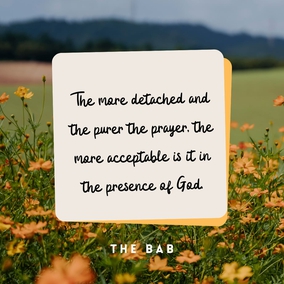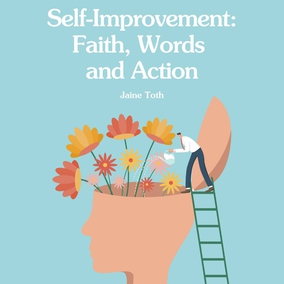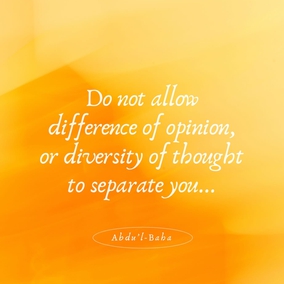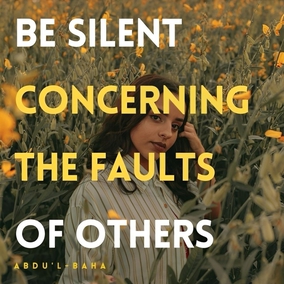The views expressed in our content reflect individual perspectives and do not represent the authoritative views of the Baha'i Faith.
One day a friend, Heidi, told me how she learned to live her life in a prayerful way.
It happened not long after she got a Baha’i prayer book in Chinese. In it, five steps of prayer are listed in the front pages of the book.
Those five steps, given as personal suggestions to an early Baha’i named Ruth Moffett by Shoghi Effendi, the Guardian of the Baha’i Faith, aren’t a formal part of the Baha’i teachings, and the Guardian advised Baha’is not to adopt them “strictly and universally.” But they really helped Heidi.
This is Heidi’s story:
The first time I read the five steps of prayer it fascinated me. So I prayed for guidance to use these five steps in my daily practice. At that time I got frustrated with my family situation easily, so one day I prayed to God for the strength and spiritual guidance to help me overcome the frustration. After the prayer, at some point I felt strongly a belief that God will help me, so in that period of time I determined to be kind to people around me and not break the Baha’i teachings, which I had promised God I would follow. A month passed by, and I felt like I had more strength to follow those teachings better. Every time a situation came up I stayed focused and had faith in God. There were a few times I failed, but once I was aware I immediately put myself back into focus and kept trying. To be able to control the frustration better, I believe that spiritual assistance was provided and came through to me. It strengthened me and helped me to not be caught up in negative feelings. Even when I was feeling frustrated it helped me be able to do the right things and be kind to others. I believe God really helped me through this and to maintain focus. This strength is the spiritual power I have never experienced before.
I am so astonished by the spiritual progress Heidi made—by using the five steps of prayer in her daily life, her prayer was answered exactly as she requested.
Let’s look at those five steps, written down by Mrs. Moffett in her book Call to Prayer. She advised people who read the book to “use these five steps if we have a problem of any kind for which we desire a solution, or wish help:”
- Pray and meditate about it. Use the prayers of the Manifestations as they have the greatest power. Then remain in the silence of contemplation for a few minutes.
- Arrive at a decision and hold this. This decision is usually born during the contemplation. It may seem almost impossible of accomplishment, but if it seems to be as answer to a prayer or a way of solving the problem, then immediately take the next step.
- Have determination to carry the decision through. Many fail here. The decision, budding into determination, is blighted and instead becomes a wish or a vague longing. When determination is born, immediately take the next step.
- Have faith and confidence that the power will flow through you, the right way will appear, the door will open, the right thought, the right message, the right principle or the right book will be given you. Have confidence, and the right thing will come to your need. Then, as you rise from prayer, take at once the fifth step.
- … lastly, ACT; Act as though it had all been answered. Then act with tireless, ceaseless energy. And as you act, you, yourself, will become a magnet, which will attract more power to your being, until you become an unobstructed channel for the Divine power to flow through you.
Many pray but do not remain for the last half of the first step. Some who meditate arrive at a decision, but fail to hold it. Few have the determination to carry the decision through, still fewer have the confidence that the right thing will come to their need. But how many remember to act as though it had all been answered? How true are those words – ‘Greater than the prayer is the spirit in which it is uttered’ and greater than the way it is uttered is the spirit in which it is carried out. – Ruth Moffett, Dua, The Call to Prayer, pp. 27-28.
My friend Heidi prayed and followed these five steps first. When frustrating situations arose, she remembered the decision she made to get over the situation through consultation and holding to the decision.
Heidi had no doubt about whether what she prayed for will happen or not—not even to consider how challenging that might be. So she carried the decision into the third step of determination, and had the faith to act in the fourth and fifth steps. Even if she failed at first to put herself back into focus, she continued to act with ceaseless energy. In this mode, Heidi felt more strength, as if she had become a magnet to attract more power and make things happen.
If Heidi had the slightest bit of doubt about herself, or thought it was impossible to not get caught up in the frustration again, then she would never have a chance to move up to the third step of prayer and to act upon it.
This is the key—if we have doubt about our ability to make a decision with God’s help, then we will never be able to trust God and rely on his spiritual power.
Many times in life, the solution to a problem we face goes beyond our own ability to resolve it. This is why having strong faith in God and believing in His assistance is so important—so we can work toward the solution and receive the spiritual force we need.
These five steps of prayer do not just happen at the moment we sit down to pray—they happen all day long, every day. During this period of time when we practice the five steps, we live our lives in prayer mode. This happens when we feel the inspiration from our spirit after we pray, put that feeling into action in our daily life, and continue to act it out even if we encounter difficulty. When we do this with confidence, and we believe and act with tireless and ceaseless energy, then eventually we will see the result and realize our prayer has been answered:
The mind and spirit of man advance when he is tried by suffering. The more the ground is ploughed the better the seed will grow, the better the harvest will be. Just as the plough furrows the earth deeply, purifying it of weeds and thistles, so suffering and tribulation free man from the petty affairs of this worldly life until he arrives at a state of complete detachment. His attitude in this world will be that of divine happiness. Man is, so to speak, unripe: the heat of the fire of suffering will mature him. Look back to the times past and you will find that the greatest men have suffered most. – Abdu’l-Baha, Paris Talks, p. 178.
















Comments
Sign in or create an account
Continue with Googleor